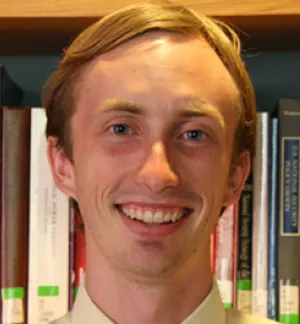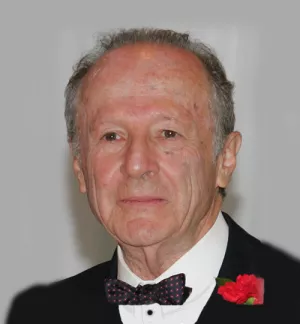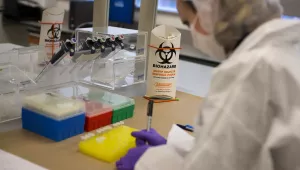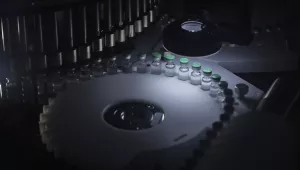An Interview with Dr. Matthew Meselson
Following a U.S.-Russian proposal and UN Security Council resolution in September, the challenging task of securing, transporting, and ultimately destroying Syria's chemical weapons has fallen largely to the technical experts of the Nobel Prize-winning Organization for the Prohibition of Chemical Weapons (OPCW).
Dr. Matthew Meselson, a long-time chemist, microbiologist, and adviser to the U.S. and foreign governments, has been working on arms control and the disposal of deadly chemical weapons since 1963. He is now the Thomas Dudley Cabot Professor of the Natural Sciences at Harvard University and co-director of the Harvard Sussex Program on Chemical and Biological Weapons. To provide a backgrounder on chemical weapons and insights on the complicated challenge ahead for Syria and the OPCW, Dr. Meselson agreed in late September to sit down for an interview with Belfer Center research assistant Andrew Wojtanik.
LISTEN: The full-length interview with Dr. Matthew Meselson
Click here to download, or listen below.
The following is a partial transcript of that interview.
Dr. Meselson, thanks for joining me. First of all, how did you get into this field?
In 1963, I was asked to spend three months at the Arms Control and Disarmament Agency as a consultant. My field was to think and write about potential arms control in the field of chemical and biological weapons. Since that time I have stayed interested in the subject. I became particularly involved in the problem of demilitarizing—which means destroying obsolete chemical weapons, both American and Russian. I served for years on the panel of the National Academy of Sciences, which advised the Army on how to get rid of surplus and unwanted chemical weapons. After the Chemical Weapons Convention, I was sent to the Soviet Union to assist the Russians in getting rid of their chemical weapons. Although in the past five of six years I haven't directly dealt with these matters, they are under pretty good control—in the United States and Russia, at least.
Great. If I may turn to Syria: this summer, a number of foreign intelligence agencies, as well as the United Nations, concluded with high confidence that chemical weapons—specifically lethal sarin gas—were used on the morning of August 21 in the suburbs of Damascus. To determine whether chemical weapons were used, what were the U.S., UN, and others specifically looking for as evidence?
The principle thing was sarin itself (in the air), and in the case of biomedical samples (blood), a specific breakdown product of sarin. These samples were taken in very special containers under careful custody back to the headquarters of the Organization for the Prohibition of Chemical Weapons (OPCW) in the Netherlands. Then, in two different laboratories, these samples were analyzed, and both laboratories agreed that the presence of these breakdown products and sarin itself was decisive. In general, when two labs get the same results, you can have very high confidence—I would say certainty—that their results are correct.
What is the timeframe for this process?
Once you have the samples, have logged them in, and have taken care of the paperwork, the actual analysis is a matter of hours.
Tell me a bit about the history of chemical weapons.
In World War I, there were many different chemicals used, starting with chlorine gas—which does not attack the skin but attacks the lungs—and developing on to mustard, which attacks the lungs but also the skin. Phosgene and other chemical weapons were also used. In World War II, there was no use of chemical weapons except in the Pacific theater. But after the war, we discovered that the Germans had developed a new category of chemical weapons called nerve agents, which surpassed the previous chemical weapons in their toxicity. And then the United States developed a large stockpile of nerve agent, artillery projectiles, bombs, and spray tanks (all of which is either now destroyed or being destroyed). The Soviets and a number of other countries did the same. Only in the 1980s did we get the Chemical Weapons Convention (CWC), which prohibits not just the use (prohibited in the 1925 Geneva Protocol), but the possession and development of chemical weapons. It's a very all-inclusive treaty, but there are a few nations that are not parties to it, including Israel, Egypt, South Sudan, and Myanmar.
And up until very recently, Syria.
And of course, Syria. It would be very good now that Syria has joined the Convention, we could now convince the Israelis and the Egyptians to join the CWC. That would mean that throughout the Middle East, that would get rid of chemical weapons for the whole area. And maybe they could also get into the Biological Weapons Convention, which those countries are also not States' Parties to.
What is your precise definition of a "chemical weapon"?
It means the use of a toxic chemical to cause casualties.
Could you describe sarin in some more detail?
Well, it's something like water in the sense that is a liquid under normal room conditions and it does evaporate like water does. But if you get it on your skin, or if you inhale it, depending on the dose, it can either make you very ill or it can kill you. Sarin inactivates an enzyme that is supposed to turn off nerve signaling. The result is that nerve impulses, which should just be brief, instead keep on and lead to a kind of paralysis. The diaphragm, the big muscle that moves the lungs back and forth, stops working, and so you stop breathing.
How can one produce sarin?
Sarin is produced in chemical factories, and it can either be placed in munitions as sarin, or as so-called "binary" chemical weapons—which means the combination of two different chemicals which are not yet mixed, and neither of which is highly toxic, but which upon firing or releasing, form the toxic chemical.
If I were to go shopping at my local drug store and hardware store, could I buy the materials for a chemical weapon?
Organic phosphorus, or the phosphonic ester, is not that hard to make—but it is nothing you can just buy at a drug store.
Since nerve agents were discovered in the 1940s, has it become substantially easier to create them?
The technology has essentially stayed the same. In a sense, it has become easier because there is more chemical industry in the world, but in another sense it has become much harder because the precursors are also controlled under the CWC. You can no longer go out and buy these things.
If I could go back to Syria, you might recall that a few weeks after the August 21 attack and a vigorous debate over whether the United States should conduct retaliatory military strikes against the Assad regime, a seemingly offhand remark by Secretary of State John Kerry triggered a chain reaction of sorts that led us in a different direction: a Russian-proposed diplomatic alternative to place all of Syria's chemical weapons fully under international control. Russian and Syrian cooperation aside, what would be the technical way forward for achieving this objective?
Well, there's a quick and dirty method, which Saddam Hussein used, which is: dig a big pit, build a wooden platform, and flood the pit with some kind of hydrocarbon fuel—then put the chemical weapons on top of the wooden platform and light it. This is called open-pit burning. It's not environmentally nice, but you can get rid of things very fast that way.
The next way it could be done is to open up these chemical weapons and put in water, leave them out in the sun, and keep them warm. Over time, that will reduce what is left to much less toxic materials.
Or you could open up the weapons and pour out what’s there, and then get rid of the toxic materials separately, either by incineration, which can be done in mobile incinerators (like what we did during UNSCOM in Iraq).
Now, the Russians have a nice technology for things like sarin: they neutralize it by a process called salvolysis, involving an organic chemical that can be mixed with the toxic chemicals. That works fairly rapidly, and you are left with chemicals which are then absorbed into what is called bithumin, which is a tar-like substance. That is then stored in bricks, which are buried so that the chemicals do not leech out for, presumably, many years.
Or it could be that you take them on boats and take them to the big Parsons facility in Siberia. A ship can carry a few thousand tons of chemical agents with no problem.
How can chemical weapons be secured?
The OPCW has what are called "tamper-proof seals," of different varieties depending on what you want to seal—either a container or individual munitions with tags. Once things are under the OPCW's control, the chance of anything getting out from their control without being known is low. Then you have to take it to wherever it is you are going to destroy it.
How can the toxic chemicals be transported?
Trucks. And then if you are going to put it on ships, they must be placed in some kind of container.
The U.S.-Russian Framework Agreement set an ambitious timetable—to secure, transport, and destroy all of Syria’s chemical weapons by mid-2014. Do you think this is feasible?
I do not think it is that ambitious. It is true that it has taken many years for us and the Russians to complete destruction, and we still haven’t finished. But a great deal of that time was spent getting around to build destruction facilities and to test them to ensure they were working properly. Then, of course, we and the Russians had vastly more than the Syrians did. In addition to which, we did not have as many highly-trained and experienced people as we now have. Plus, now the OPCW may take some shortcuts, like the mobile units that UNSCOM used.
There is one other thing—sort of a "human factor." These people who work at the OPCW are very dedicated international civil servants. They will put their heart and soul into getting this done. These are not people working for profit; they are all volunteers. I think they have all been sort of invisible in the world until now, but now is their chance to shine. I believe they are going to attack this with gusto. It's going to be the high point of their lives. They will be feeling they will be doing something for all humanity.
If you were heading up this effort, how much manpower would you invest to secure Syria's chemical weapons?
I’d say a matter of days, if I had 10 or 20 people. I have a number of other people there too—I have people keeping records, medical personnel, security people, sample-taking people, and photographers. But the core people—the ones who are actually putting the seals on—could get it done in a matter of days.
I have no idea how long it would take to get to these facilities, how many roadblocks there would be, or how many misinformed Syrians with guns might be in the way. But from a technical point of view, once the inspectors are there, then you can begin to estimate based on the basis of earlier experiences.
So on the whole, you are optimistic?
Well, I am always an optimist. For the technical part, we have a lot of experience doing this, and the people will be dedicated. They will probably not work eight-hour shifts.
Do you have any other comments you would like to share?
Well, I would love to see this lead on to other good things. Speaking in the narrow field of chemical and biological weapons, let’s ask: why do people say "why are these weapons special?" Various reasons have been given. One is that it is in a sense a triumph of mankind to have completely renounced a category of weapons. That in itself is an achievement. Second, these are very indiscriminate weapons that kill non-combatants.
Another one is that, frankly, why would any reasonably sophisticated, industrialized country want to have these weapons around? These are the weapons for terrorists. We have vast conventional military capabilities. But if chemical and biological weapons were to proliferate, it would level the playing field. Units, not even countries, would have mass destructive capability. So from a purely selfish point of view, you have to be out of your mind to want them to see them start proliferating.
Finally, there's something more. I am a chemist, but my field is actually biology. Now we have seen, at least since I have gotten into science, this tremendous revolution in being able to understand, and therefore to manipulate, biology. Once our species has the power of changing what it is to be human, I think it is going to become a matter of species security, not national security, to have firmly in place the understanding that we do not exploit biology for hostile purposes. I think there will come a day where either we will have established that or we are going to enter a really monstrous period of history. It may in the end represent something that robs us of our humanity.
"Syria, the OPCW, and Chemical Weapons 101." An Interview with Dr. Matthew Meselson, Belfer Center for Science and International Affairs, Harvard Kennedy School, November 7, 2013.






